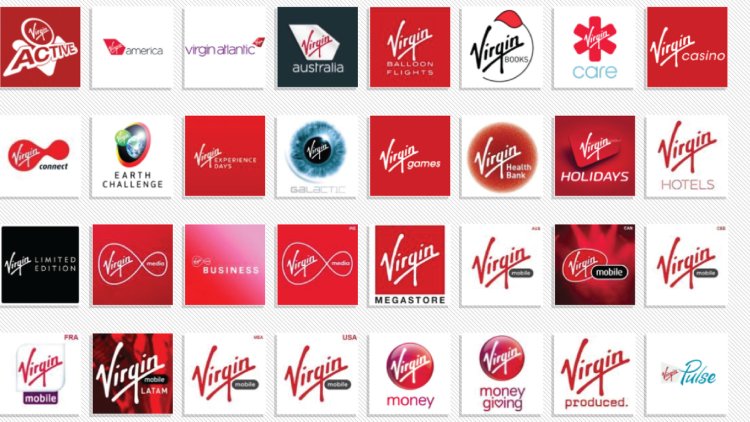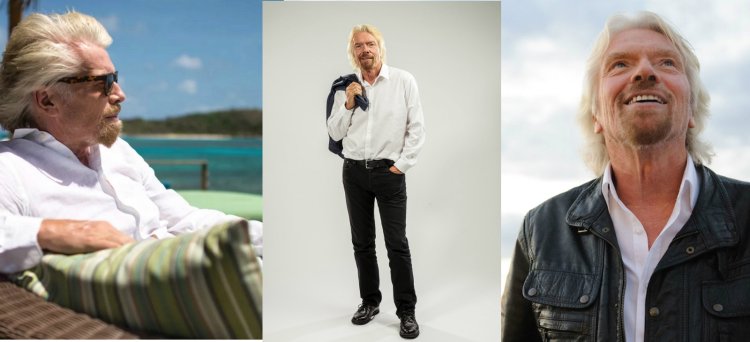Unveiling the Virgin America Success Story: Soaring to New Heights
Richard Branson is the esteemed founder of the Virgin Group, a globally renowned brand that spans diverse sectors including travel, telecommunications, health, banking, music, and leisure. Initially starting as a mail order record retailer in 1970, Richard ventured into founding Virgin Records. The label gained immense success with the signing of iconic artists such as Mike Oldfield, who released the acclaimed album 'Tubular Bells,' as well as renowned acts like the Sex Pistols and The Rolling Stones. Today, the Virgin Group comprises over 40 companies operating in more than 35 countries worldwide.
Richard Branson has continuously challenged himself with extraordinary feats, setting records along the way. These include completing the fastest Atlantic Ocean crossing, embarking on a series of groundbreaking oceanic balloon journeys, and even kitesurfing across the Channel. Notably, he considers Virgin Galactic, the world's first commercial spaceline, as his greatest adventure. Richard's influence extends to his massive social media following of over 40 million, and he regularly shares his insights through blogging on various topics such as entrepreneurship, the environment, adventure, and purpose.
From an early age, Richard demonstrated entrepreneurial spirit by founding the youth culture magazine Student at the age of 15. With a strong commitment to driving positive change, he established Virgin Unite in 2004. This non-profit foundation, affiliated with the Virgin Group, brings together people and entrepreneurial ideas to create opportunities for a better world. Richard now devotes most of his time to building businesses that make a positive impact while actively collaborating with Virgin Unite and affiliated organizations like The Elders, The B Team, and Ocean Unite, which have emerged from its incubation.
Images associated with Richard Branson showcase his youthful endeavors, including a black and white image of him as a student wearing thick-rimmed glasses, a turtle neck top, and a jacket. Other images feature Richard embracing his mother, Eve, as well as carrying his children, Sam and Holly Branson, on his back.
Richard graciously accepts a limited number of speaking engagements worldwide each year. All proceeds from these engagements are directed towards Virgin Unite, the entrepreneurial foundation of the Virgin Group, and advocacy causes dedicated to making business a force for good.
"Sir Richard Branson: Defying Limits, Inspiring Minds"
At the tender age of 16, Sir Richard Branson embarked on an extraordinary entrepreneurial journey. In 1968, he fearlessly launched Student, a magazine created and run solely by students. What makes this achievement even more remarkable is that Sir Richard Branson, who later became dyslexic, faced challenges with reading, writing, and spelling, often enduring reprimands for his behavior. The inaugural edition of Student generated an impressive $8,000 in advertising revenue, while the first print run of 50,000 copies was distributed for free. However, Branson cleverly covered the publication costs through subsequent advertising.
Following the triumph of Student, at the age of 17, Branson resided in a London commune where he and Nik Powell conceived the idea of a mail order record company to support their magazine endeavors. As self-proclaimed "virgins" to the business world, these young entrepreneurs aptly named their venture Virgin Records. Starting from humble origins, Virgin Group has since evolved into a powerhouse, boasting an annual revenue exceeding £19.5 billion. Buoyed by the success of Virgin Records, Branson established a recording studio in Oxfordshire, England, in 1972.
The debut release under Virgin Records, Mike Oldfield's iconic single "Tubular Bells," soared to instant fame, remaining on the UK charts for an astonishing 247 weeks. Branson went on to sign other aspiring musical talents, including the Sex Pistols, The Culture Club, The Rolling Stones, and Genesis. Virgin Records flourished, expanding into Virgin Music and solidifying its position as one of the world's top six record companies.
However, Branson's ambitions were far from satiated. In 1984, he broadened his horizons by incorporating the Voyager Group travel company under his wing. The year also witnessed the introduction of Virgin Atlantic airline and a series of Virgin Megastores. Yet, despite these triumphs, Branson encountered financial challenges, with Virgin facing turbulent times by 1992.
Undeterred, Richard Branson pressed on. In 1993, he launched Virgin Radio, followed by the establishment of a second record company, V2, in 1996. The unveiling of Virgin Trains took place in 1997, albeit accompanied by considerable criticism within a year. Virgin Mobile emerged in 1998, and in 2004, Branson made history with the launch of Virgin Galactic, an airline destined for space travel. The Virgin Active UK gym chain was born in 2005, while the announcement of Virgin Voyages in 2015 signaled the upcoming debut of a revolutionary cruise line. Scheduled to set sail in 2020, these Virgin cruise ships are designed to accommodate 2,800 guests and employ a crew of 1,150.
Gradually, the Virgin Group expanded its global footprint, operating in 35 countries with a workforce of nearly 70,000. The company's reach extends across the United Kingdom, the United States, Australia, Canada, Asia, Europe, and South Africa, among other regions.
At every stage of his remarkable journey, Richard Branson has set audacious goals, challenging norms, breaking records, and inspiring individuals to surpass their limits. Knighted for his exceptional contributions to entrepreneurship in 1999, he currently resides on his private island, Necker Island, in the British Virgin Islands. Always driven by a desire to make a positive impact, Branson actively engages in humanitarian services and fearlessly addresses crucial global issues with unwavering enthusiasm and unwavering determination.
The Rise and Legacy of Virgin America: Redefining Air Travel
Elevating the Skies with Innovation and Style
Virgin America, a modern and dynamic airline, took the aviation industry by storm during its brief existence from 2007 to 2018. Operating as an independent carrier under the esteemed Virgin Group brand, it left an indelible mark on the West Coast and beyond. Though its journey spanned a mere 11 years, Virgin America emerged as a beloved and successful airline before being integrated into Alaska Airlines in 2018.
Taking Flight in 2007
In 2004, Richard Branson and the visionary minds at the Virgin Group set their sights on launching a US-focused airline. This low-cost carrier, akin to Virgin Australia, aimed to cater to the West Coast market, establishing its headquarters in vibrant San Francisco. However, the path to takeoff was not without obstacles. Securing funding proved challenging, and licensing delays arose due to objections from rival airlines and labor unions.
After restructuring the company and addressing concerns regarding foreign ownership, Virgin America finally obtained its operating license in early 2007. The inaugural flights took off on August 8th, 2007, connecting New York JFK to San Francisco and facilitating travel along the West Coast from Los Angeles to San Francisco. The first landing in San Francisco marked the beginning of a new era in air travel.
Expansion of Service and Fleet
Over the subsequent years, Virgin America expanded its services primarily from its hubs in San Francisco and Los Angeles, with a notable secondary hub in Dallas at Love Field Airport. The repeal of the Wright Amendment in 2014, which previously restricted operations at the airport, enabled the airline to establish a strong presence in Dallas. While primarily focusing on domestic routes, Virgin America briefly ventured into international operations, serving Toronto, Canada, and various leisure destinations in Mexico.
In tandem with its growing network, Virgin America bolstered its all-Airbus fleet. Starting with 18 aircraft in 2007 (13 A320ceo and five A319ceo), it steadily increased its fleet size. By 2013, the airline boasted 52 aircraft (42 A320ceo and 10 A319ceo), and at the time of its merger in 2018, it operated 67 aircraft (53 A320ceo, 10 A319ceo, and four new A321neos). These figures are derived from data provided by AeroTransport Data Bank (ATDB.aero).
Setting New Standards
Virgin America distinguished itself through innovation and customer-centric offerings. It was at the forefront of social media marketing, assembling a dedicated team as early as 2007—a time when platforms like Twitter were still in their infancy. Notably, it became the first US airline to provide onboard WiFi on all flights, facilitated through its partnership with Gogo.
Merger with Alaska Airlines
In 2016, Alaska Airlines emerged as the successful bidder to acquire Virgin America, with competing interest from JetBlue. The move was driven by Alaska Airlines' desire to enhance its presence on the West Coast amid intensifying competition, particularly from Delta Air Lines in Seattle. After overcoming various obstacles, the acquisition gained approval in December 2016.
Valued at approximately $4 billion, including debt and aircraft lease agreements, the deal allowed Alaska Airlines to assume Virgin America's outstanding orders for the Airbus A321neo, maintaining the momentum of this groundbreaking aircraft. While some of Virgin America's leased A320s were retired, the airline continued operations until January 2018, when the operating licenses of both carriers merged. The iconic Virgin America brand persisted until late April 2018 when it gracefully bid farewell to the skies. Its legacy lives on, infused into the fabric of Alaska Airlines.
Virgin America's innovative spirit, commitment to exceptional service, and memorable flying experiences will forever be treasured by passengers and aviation enthusiasts alike. As Alaska Airlines carries the torch forward, a piece of Virgin America's vibrant essence remains embedded within the ever-evolving landscape of air travel.
What's Your Reaction?






















